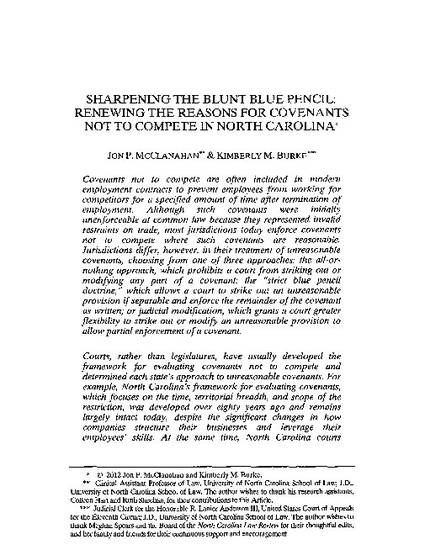
Article
Sharpening the Blunt Blue Pencil: Renewing the Reasons for Covenants Not to Compete in North Carolina
North Carolina Law Review
(2012)
Abstract
Covenants not to compete are often included in modern employment contracts to prevent employees from working for competitors for a specified amount of time after termination of employment. Although such covenants were initially unenforceable at common law because they represented invalid restraints on trade, most jurisdictions today enforce covenants not to compete where such covenants are reasonable. Jurisdictions differ, however, in their treatment of unreasonable covenants, choosing from one of three approaches: the all-or nothing approach, which prohibits a court from striking out or modifying any part of a covenant; the "strict blue pencil doctrine," which allows a court to strike out an unreasonable provision if separable and enforce the remainder of the covenant as written; or judicial modification, which grants a court greater flexibility to strike out or modify an unreasonable provision to allow partial enforcement of a covenant.
Courts, rather than legislatures, have usually developed the framework for evaluating covenants not to compete and determined each state's approach to unreasonable covenants. For example, North Carolina's framework for evaluating covenants, which focuses on the time, territorial breadth, and scope of the restriction, was developed over eighty years ago and remains largely intact today, despite the significant changes in how companies structure their businesses and leverage their employees' skills. At the same time, North Carolina courts continue to adhere to the state's version of the strict blue pencil doctrine first adopted in 1961.
This Article examines the current state of covenants not to compete in North Carolina. Because of the jurisdiction's adherence to an outdated reasonableness framework and continued reliance on the strict blue pencil doctrine, North Carolina courts are faced with the task of evaluating twenty-first century covenants using twentieth century tools-leading to contradictory case law and strained reasoning. This Article concludes that North Carolina courts need a different equitable tool in order to truly ensure that covenants not to compete fairly balance the interests of employees and employers, and it suggests several judicial and legislative reforms that would create a
consistent, yet flexible, framework for evaluating and enforcing non-compete agreements.
Keywords
- contracts,
- covenants not to compete,
- non-compete agreements,
- blue pencil doctrine,
- employment law
Disciplines
Publication Date
September, 2012
Citation Information
Jon J. Lee and Kimberly M. Burke. "Sharpening the Blunt Blue Pencil: Renewing the Reasons for Covenants Not to Compete in North Carolina" North Carolina Law Review Vol. 90 Iss. 6 (2012) p. 1931 Available at: http://works.bepress.com/jon-lee/8/
